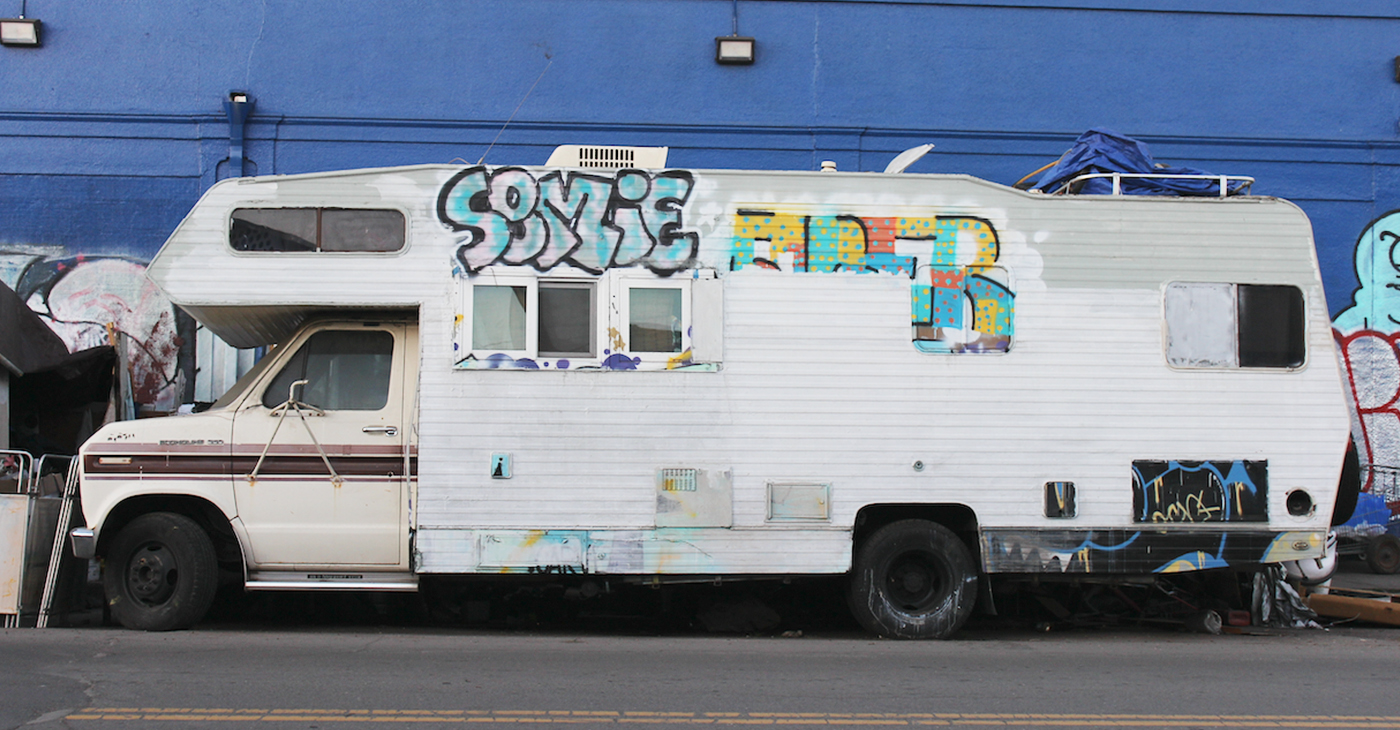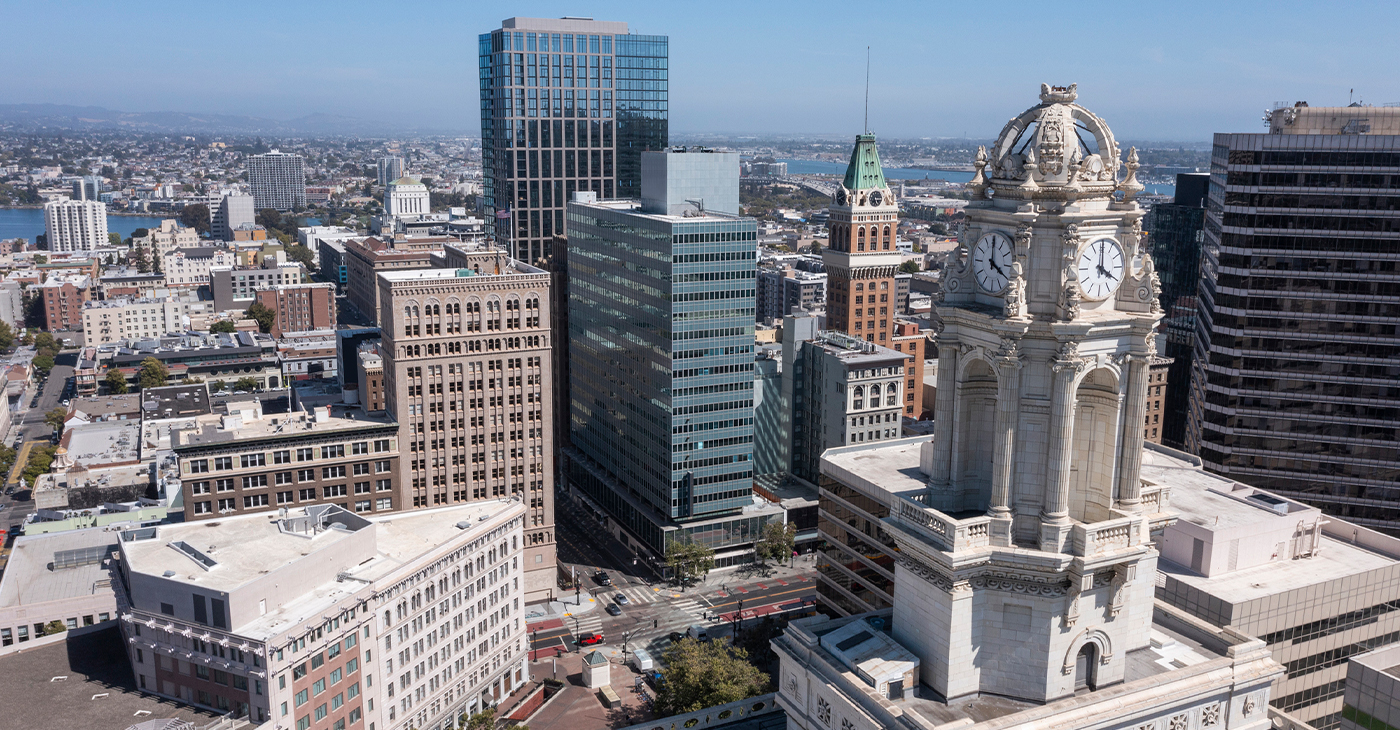City Government
Councilmember Gallo Introduces RV Parking Ban Proposal
Oakland has 147 total spaces for RV parking in the Safe Parking Programs the city has helped set up through non-profit organizations, according to Citywide Communication Director Karen Boyd. None of these spaces are currently available for residents.

By Zack Haber
During a Public Works Department committee meeting on March 22, Councilmember Noel Gallo introduced an ordinance to amend the city of Oakland’s municipal code to place limitations on large, non-commercial vehicles parking in certain streets.
The proposal would make it illegal to park a vehicle that is longer than 22 feet, wider than 7 feet, and/or taller than 7 feet on any street that is 40 feet wide.
Since the vast majority of RVs and trailers are larger than the dimensions listed, advocates for people that live in such vehicles and vehicle dwellers themselves have labeled the legislation as an RV ban. According to a draft that Oakland’s Department of Transportation shared with The Oakland Post, about 79% of Oakland streets are 40 feet wide or narrower.
“This proposal would give the city authority to tow and impound peoples’ vehicle dwellings leaving them on the street with no shelter,” reads an Instagram post from Love and Justice in the Streets, a grassroots advocacy group for Oakland residents experiencing homelessness. “It does not include any real solutions or offer any housing solutions to Oakland residents who currently find shelter in RVs.”
The language in Gallo’s proposal lists blocking bike lanes, access for emergency vehicles and improving visibility for drivers as reasons for the ban.
“I think the policy is very clear, that I can’t do anything I want in front of (Councilmember) Dan Kalb’s house or park my RV therein and leave my trash and garbage whenever I want to,” said Gallo. “I bring this request to you on behalf of the residents that have been here a lifetime that are trying to send their children to school but cannot walk on the street because they’re being blocked off.”
A little over a dozen residents spoke out against Gallo’s proposal during the meeting, saying it would harm vehicle dwellers by taking their homes without offering solutions, especially as some vehicles that serve as homes are difficult to move as they no longer run.
Judy Elkin said, “people need these vehicles for their homes.”
Oakland unhoused resident Nino Parker said the proposal would “just put more people on the street” and that it was “going to make the problem worse.” The legislation would charge the person living in a vehicle that gets towed for towing and storage fees, although it doesn’t list where vehicles would be stored. Parker suggested that if the proposal passes, vehicle dwellers who have their homes towed should move to District 5, which is Gallo’s district.
Two residents spoke in favor of Gallo’s proposal during the meeting. One of these residents, who identified their self only using their first name, Patricia, said “hopefully the RVs can just go into the lots that have already been set up for parking because they pose a problem when you’re cycling around the city.”
Oakland has 147 total spaces for RV parking in the Safe Parking Programs the city has helped set up through non-profit organizations, according to Citywide Communication Director Karen Boyd. None of these spaces are currently available for residents.
“None of the sites have vacancies right now,” wrote Boyd in an email. “Not all of the sites are full, but they are not able to take new people for various reasons.”
Gallo’s proposal does not add any additional spaces for RV parking.
Ultimately, the Public Works Committee, which in addition to Gallo also includes Councilmembers Loren Taylor, Dan Kalb and Sheng Thao, unanimously decided to delay voting on the proposal until a meeting on May 24. Taylor and Kalb asked for a supplemental report on the proposal that would address how it would be enforced, whether the city could determine which RVs belonged to Oakland residents and/or those who worked in Oakland, and information on other similar ordinances from other nearby cities.
Thao asked for a plan as to where the RVs would go if they were towed.
“If we are removing RVs from streets, where are we bringing them?” she asked. Then stated that she “doesn’t want them just shifting around.”
On May 24, the Public Works Committee is scheduled to receive a supplemental report that aims to address inquiries by Taylor, Kalb and Thao about Gallo’s proposal. The committee is then scheduled to vote on the proposal.
If the majority of the committee votes to pass the proposal, the entire City Council could then vote it into law in a future meeting.
Activism
Oakland Post: Week of April 17 – 23, 2024
The printed Weekly Edition of the Oakland Post: Week of April 17 – 23, 2024

To enlarge your view of this issue, use the slider, magnifying glass icon or full page icon in the lower right corner of the browser window. ![]()
Bay Area
Oakland Finishes Final Draft of Downtown Specific Plan for Potential City Improvements
In late March, Oakland’s city administration announced the final draft of their Downtown Specific Plan, a blueprint for city improvements and developments over the next 20 years. The comprehensive 474-page plan lays out policies for downtown developments that will increase economic, social and cultural, and communal opportunities for residents and workers who frequent this essential hub in Oakland.

By Magaly Muñoz
In late March, Oakland’s city administration announced the final draft of their Downtown Specific Plan, a blueprint for city improvements and developments over the next 20 years.
The comprehensive 474-page plan lays out policies for downtown developments that will increase economic, social and cultural, and communal opportunities for residents and workers who frequent this essential hub in Oakland.
Several departments over the course of eight years developed the plan, with two phases that emphasized a need for community input from local stakeholders, such as leaders and residents, and a focus on the role of social and racial equity in past and future developments.
Throughout the extensive plan, the concept of equity for marginalized communities is embedded with each goal and priority for the improvements to downtown. It acknowledges that social and racial barriers are preventing these communities from thriving on an equal playing field.
The authors identified six key disparities, or ‘equity indicators’, that set the baseline for how success will be measured for the improvements. These indicators include the burden of housing costs, homelessness, displacement, disconnected youth, unemployment rate and median income.
The plan is also broken up into chapters, each describing a major issue or topic that is plaguing downtown residents and workers, such as mobility, culture preservation, community health and sustainability, and land use and urban design.
Within each chapter, the authors dedicate a section to the impacts of the COVID-19 pandemic for the various areas of interest, illustrating how disparities and inequities increased before and after the disease’s peak.
Two major issues highlighted in the plan are economic opportunity and housing and homelessness. Both of these issues have been aggravated by the pandemic and require substantial support and resources to move forward.
Many reports coming out of the commercial and residential districts downtown have blamed the rise in crime and cost of living as reasons for leaving Oakland for other cities or closing down indefinitely.
The plan attributes rising rents of both residential and commercial properties to the displacement of local businesses and entrepreneurs. Downtown also has an imbalance in the jobs to housing ratio, which limits access to jobs as commuting distances increase.
Other concerns for the local economy are barriers to employment opportunities for workers of color, non-English speakers, and those with limited access to transportation. As stated in the plan, downtown also has a lack of vacancies near public transit hubs, such as BART, bus stops or ferry terminals, which could save workers money and time for their commutes into the city.
According to the downtown plan, the average unemployment rate for the white population was 5.9%, but the Asian population was at 6.7%, and for the Black population it was even higher at 10.4%.
The proposed solutions for the lack of economic prosperity include providing assistance to local businesses owned by people of color, reinforcing downtown as the ‘place to be’ for nightlife entertainment, and building businesses closer to public transit.
The addition of over 18.3 million (m) sq. ft. of new commercial space, 1.3m sq. ft. of new institutional space, and 500,000 sq. ft. of new industrial space, could potentially create almost 57,000 jobs downtown.
Housing and homelessness, issues closely tied to economic prosperity, are top concerns for Oakland residents. High rents have led to displacement and homelessness for those unable to keep up with the rising costs of the Bay Area.
Over 5,000 people are currently experiencing homelessness in Oakland, according to 2022 Point In Time data. 60% of this population is Black despite only making up nearly 20% of the total city population.
The plan explains that by adding nearly 29,000 new homes and expanding affordable housing units across the city by 2040, this would help alleviate the stress of obtaining and affording a home.
Strategies proposed to tackle the housing and homelessness crisis include increasing renter protections, providing additional shelters and services for homeless residents, and promoting homeownership in downtown with first-time buyer assistance and proactive assistance to vulnerable homeowners.
The plan acknowledges that the implementation of changes and developments amongst the several concerns outlined in the document will take time, both in short and long term periods.
To better explain how and when each project will be addressed over the course of the next two decades, a detailed 123-page graph shows which agencies, potential funding sources, and costs come with the goals.
The Oakland Planning Commission and Landmarks Preservation Advisory Board will each hold public hearings regarding the final draft of the Downtown Plan in May and June.
City Government
LAO Releases Report on Racial and Ethnic Disparities in California Child Welfare System
Racial inequalities in California’s child welfare system disproportionately impact poor Black and Native American children, according to a report released April 3 by the nonpartisan Legislative Analyst’s Office (LAO). The report, which was presented to the Assembly Subcommittee No. 2 on Human Services — chaired by Assemblymember Corey Jackson (D-Moreno Valley) — states that the proportion of low-income Black and Native American children in foster care is four times larger than other racial and ethnic groups in the state.

Racial inequalities in California’s child welfare system disproportionately impact poor Black and Native American children, according to a report released April 3 by the nonpartisan Legislative Analyst’s Office (LAO).
The report, which was presented to the Assembly Subcommittee No. 2 on Human Services — chaired by Assemblymember Corey Jackson (D-Moreno Valley) — states that the proportion of low-income Black and Native American children in foster care is four times larger than other racial and ethnic groups in the state. Half of the children from each racial group has experienced some level of child welfare involvement before reaching legal age.
Jackson is a member of the California Legislative Black Caucus.
“Racial and ethnic disproportionality and disparities are present within initial allegations and persist at all levels of the system — becoming the most pronounced for youth in care,” the report states.
The disparities have persisted over the last decade across the state, the LAO found, adding that Black children living in poverty are more likely to enter foster care. State data shows that there is a correlation between poverty and foster placement in each county.
“Throughout all levels of the child welfare system, families experiencing poverty are more likely to come to the attention of and be impacted by the child welfare system,” stated the report.
Overall, the report revealed that more than half of the families affected by the state child welfare system earn $1,000 per month, significantly less than the national average of $5,000 a month.
The financial disparities highlighted in the LAO report align with existing research indicating that poverty is among the main factors contributing to the likelihood of child maltreatment. State anti-poverty programs include cash aid, childcare subsidies, supportive housing, and nutrition assistance.
-

 Activism4 weeks ago
Activism4 weeks agoOakland Post: Week of March 20 – 26, 2024
-

 #NNPA BlackPress3 weeks ago
#NNPA BlackPress3 weeks agoCOMMENTARY: D.C. Crime Bill Fails to Address Root Causes of Violence and Incarceration
-

 #NNPA BlackPress4 weeks ago
#NNPA BlackPress4 weeks agoFrom Raids to Revelations: The Dark Turn in Sean ‘Diddy’ Combs’ Saga
-

 #NNPA BlackPress3 weeks ago
#NNPA BlackPress3 weeks agoMayor, City Council President React to May 31 Closing of Birmingham-Southern College
-

 #NNPA BlackPress4 weeks ago
#NNPA BlackPress4 weeks agoCOMMENTARY: Lady Day and The Lights!
-

 Activism3 weeks ago
Activism3 weeks agoOakland Post: Week of March 27 – April 2, 2024
-

 #NNPA BlackPress4 weeks ago
#NNPA BlackPress4 weeks agoBaltimore Key Bridge Catastrophe: A City’s Heartbreak and a Nation’s Alarm
-

 #NNPA BlackPress4 weeks ago
#NNPA BlackPress4 weeks agoBaltimore’s Key Bridge Struck by Ship, Collapses into Water
















































